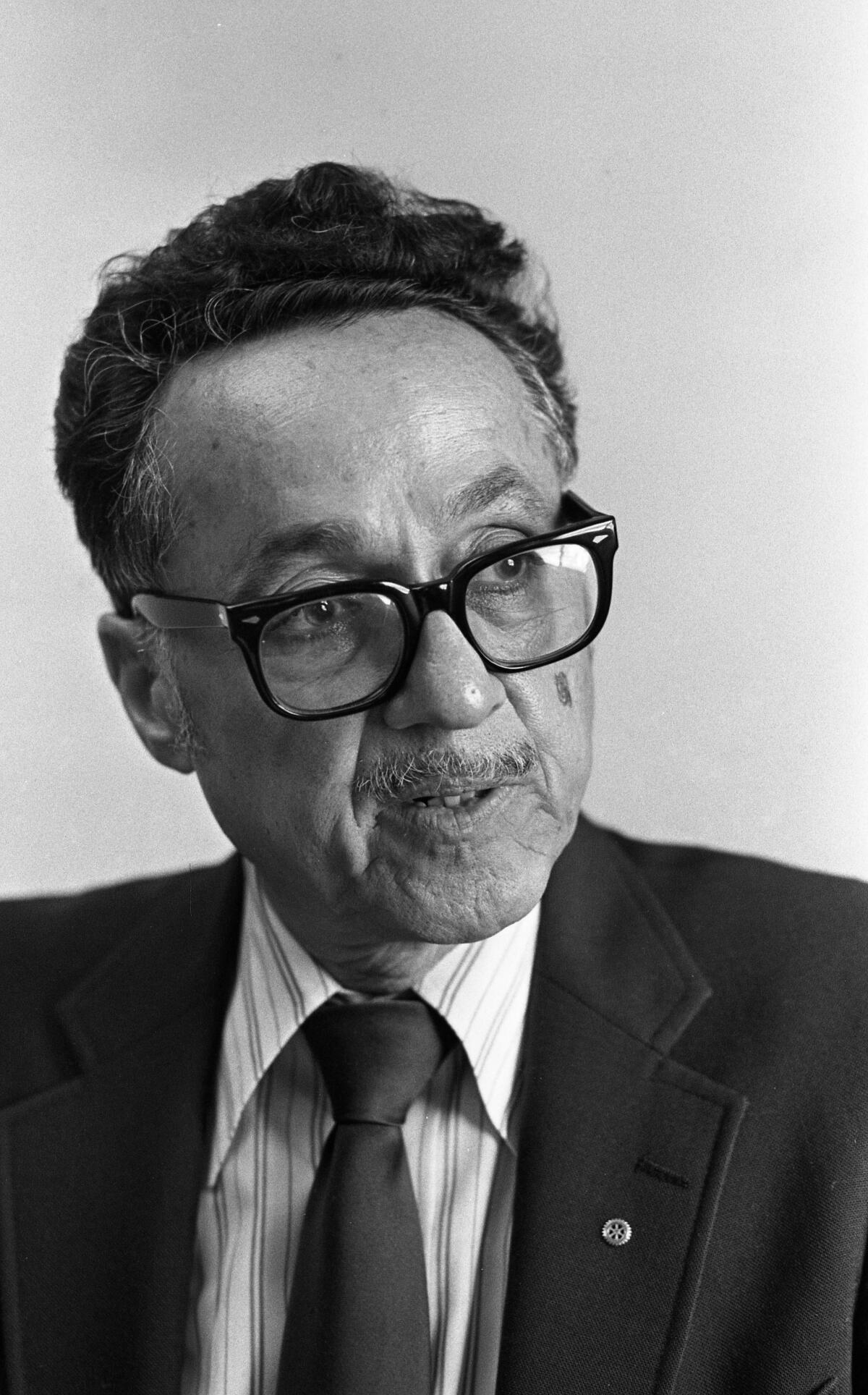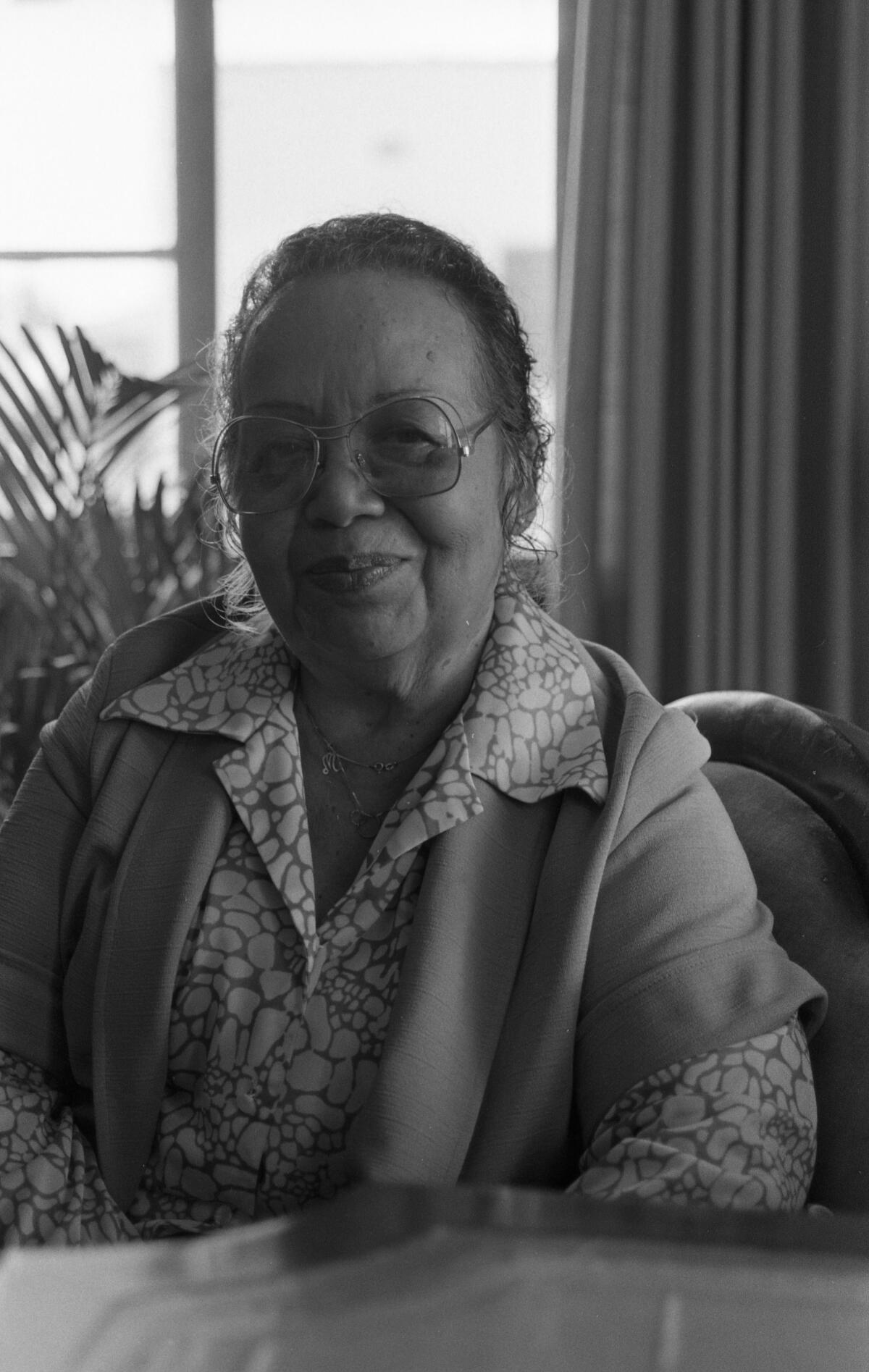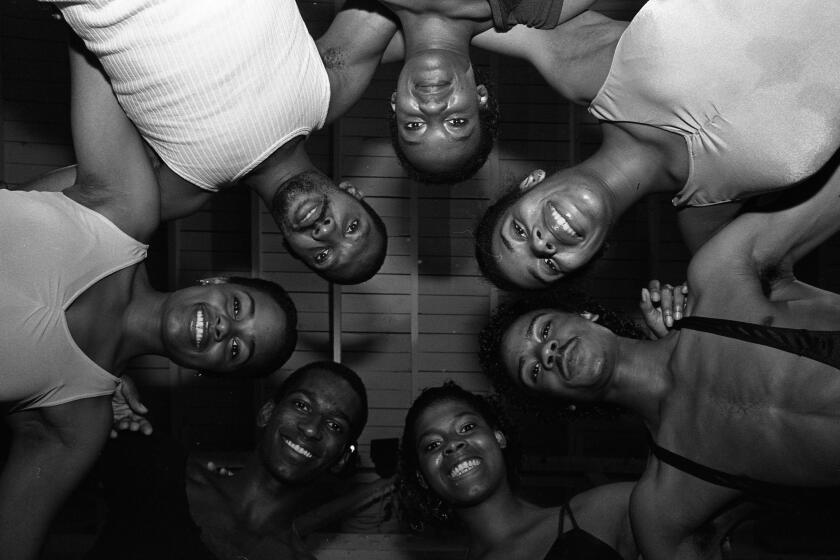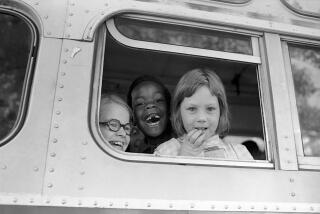Reflections in Black: 4 leaders assess the rights struggle

- Share via
This story originally ran in 1982 as part of the “Black L.A.: Looking at Diversity” series. We have preserved the original text in order to provide an accurate account of the work in print.
As black Los Angeles settles into the last quarter of the 20th Century, many of the people involved in the local struggle for equality are pausing to look back on the successes and failures of the civil rights movement.
Their idealistic fervor, which fueled the movement during the 1950s, turned into militant anger after the upheaval in Watts in 1965. Later, in 1979, this spirit sank into frustration when the Robbins anti-busing amendment to the state Constitution was approved by voters.
There is no consensus on how much progress blacks in Los Angeles have actually made during the past 20 years. There is, however, a belief that blacks have made progress but still have a long way to go.
The Times talked to four prominent blacks whose experiences span seven decades of Los Angeles history to get their views on black life in Los Angeles. They were:

Judge Billy G. Mills, 52, supervising judge for the family law section of the Los Angeles Superior Court and a former member of the Los Angeles City Council.
Elbert T. Hudson, 61, president of Broadway Federal Savings and Loan Assn., former president of the Los Angeles branch of the National Assn. for the Advancement of Colored People and a former Los Angeles police commissioner.
Marbesba T. Tackett, 74, former executive director of the Southern Christian Leadership Conference/West who has served with the Fair Housing Congress, the Housing Opportunity Center, and the city of Los Angeles Housing Commission.
Wendell Green, 62, a former editor of the Los Angeles Sentinel who has worked on a variety of black publications in the city.
In the summer of 1982, The Times published a series on Southern California’s Black community called “Black L.A.: Looking at Diversity.”
Q: Have blacks come as far as you thought they would 20 years ago when the civil rights movement started to shake up society?
Hudson: Even though I was idealistic, I am not too sure that my expectations were as great as what has actually occurred. Blacks have achieved more than I ever thought possible.
Green: I think there has been economic advancement and that is what I have always been concerned about … I am gratified with what goes on in City Hall. I know there are a lot of blacks holding important jobs now. What disgusts me is that a lot of young people don’t take advantage of the opportunity that is offered to them. I don’t mean just jobwise. I am talking about all kinds of education and training and everything that we never even thought about 40 years ago.
Tackett: I think we have come a tremendous way in the last 20 years. I talked with a group of people at Xerox a couple years ago--more than a hundred blacks who were employed at that office--and I asked them how many of them were employed at Xerox before 1964. Not a single one. There was one person who was employed in 1965. So we have come a long way, but I see a conspiracy in education that will gradually stop that progress because there will not be people to take their place unless we have people trained to do it.
Q: On an individual basis do you think blacks are less aggressive in their pursuit of civil rights now?
Mills: I think probably so because a lot of the panic has been taken out.
Hudson: There is a difference in the sense that some of the major battles had been in the 1920s—the fight then was to stop lynchings … Things changed and the next struggle was entrance into professional schools … Then the school desegregation battle which began in 1954, the Civil Rights Act in the 1960s and the fights of Martin Luther King, those things resulted in positive change. I don’t think the need is the same now for the same kind of aggressive conduct. The problems are more complex now than they were and they require different treatment. I don’t think black people are any less aggressive but different techniques are required.
Green: They are less aggressive. They are less organized. Because they are less organized, things aren’t happening like they used to.
Q: Los Angeles has a black mayor, black representatives, black members of Congress … Have they made the difference that you hoped they would?
Mills: Yes, there will be hundreds of thousands of black kids all over this country who now know that they can be mayor, that they can be governors and will work to that end because they see people like Tom Bradley are there. That is why black politicians are important, at least from the symbolic standpoint … From a power standpoint, being there means that when you are mayor, conversations are phrased differently, agendas are prepared different. I guess I’m just not talking about being there, I guess I’m talking about clout.
Hudson: Yes, they have made a difference. They haven’t necessarily done it the way I would like to see them do it, but when you talk about clout, yes they have it. They are effective as politicians and probably more effective than their numbers would dictate. Then there is the question of image. Just having somebody in the City Council means that it is obvious to any black kid who aspires to be in the City Council that he can do so. And the black politicians have created opportunities for other blacks. There are now blacks working in staff positions for these various offices. The same at the state level. You have blacks who are familiar with the process of government that didn’t exist 20 years ago.
Green: If they never open their mouth, their mere presence makes them (other politicians) do things differently. You have to understand how lily-white this City Hall was and how prejudiced it was. There were people in various departments who were preventing black people from getting promoted. They had to change their attitude. Not all of them changed, but they just couldn’t do things as blatantly as they had been doing …
Tackett: I was never under the illusion that a black person elected into a group of 15 white people could make a tremendous difference. Therefore I feel that inasmuch as I did not expect that person or those few persons who were elected to office to perform miracles, I think they have done well. I think they have been on the right side of most issues.
Q: Is the prospect of truly integrated communities merely an idealistic dream that will never come true?
Mills: It very well could be a purely idealistic dream, but I don’t believe that most black people get upset about being in a segregated situation. That’s not the problem. The problem is when you do it as a matter of government sanction, when you have no way out. Now that’s the tragedy and that’s the tragedy that has been forced upon black people, and we are now suffering from that and I think we will permanently suffer from that because of what we have thought about ourselves as a result of institutional racism.
Hudson: I am not sure we will ever have truly integrated communities and I am not sure we will ever have true integration, but there was a time in my life when I thought it was possible. I don’t think so now. The answer has to lie with the word color. Other ethnic minorities have been able to completely assimilate into the majority community and we have not. The Italians, the Poles and others could all be fully assimilated in the second generation because they can disappear into the community. If the name was a problem they could even change that. But when it’s color, there is always going to be a difference.
Tackett: I think eventually it will happen. Of course, there is a tendency of people to want to live near people who they know or associate with or have a similar ethnic background. It isn’t so much that you want to live in an interracial neighborhood as it is that you want to be bale to buy or rent in the area that you choose to buy or rent in, and that is what the whole thing is about. It is not that you want to live next to somebody but you just want the freedom.
Q: Do you feel blacks are less united or more united than 20 years ago?
Mills: Probably less, based on the fact that we really had what appeared to be more common problems that forced us together. We were talking about freedom. The basic right to life, the right to start off so you can think in terms of achieving …
Hudson: I think race is still a unifying factor, and I think it will continue to be. There is then some almost withdrawal of the people who have reached some degree of economic security and an unwillingness to be part of a black movement or be supportive of black causes, but still the underlying motivation is the color and we are supporting many successful programs based on race, our common needs.
Q: Do you think blacks are getting a better education now than they were 20 years ago?
Mills: We are really talking about how the black kids are ever going to improve proportionately to what white kids are doing. We are really looking at black kids in competition with white kids because as long as white kids are doing so much better than black kids, we are really sort of promoting the same problems over a longer period of time … I am convinced that even with the debilities of segregated schools, parental ambition and desire for their kids can make the difference.
Hudson: No. I am not sure that I know the answer why, except I think the fact that schools are more fully segregated now than they were 20 years ago. I just don’t believe that you can get a fair shake in anything if you live in a segregated community, and as long as housing patterns continue to be segregated and busing is treated the way it is, we are not going to have quality education for blacks, barring a massive infusion of money and a commitment on the part of the school district.
Tackett: No. I think that the schools are more segregated now than they were then. I think that we are graduating more students from high school who cannot read. They are unemployable and they are really untrainable because at that age if you cannot read and if you do not know basic mathematics it is very difficult for you to be trained so that we find we are still compensating for the lack of education as they come through the Los Angeles city schools.
Q: There was a bitter battle over desegregation of public schools in Los Angeles. What kind of legacy do you think is left among blacks and whites in this city regarding education?
Mills: I don’t know that we will ever know whether it was just prejudice that made so many people talk about neighborhood schools, but the point is that they really do have a very legitimate thing that they can verbalize and it is very difficult for you to pierce that. You can’t get at racism when people are able to mask it with a legitimate complaint and I think that it is … Now, my background makes me kind of suspicious because I remember when I was a child walking by two or three schools to get to the school that I went to. I remember when white kids rode the bus … so naturally I am suspicious when a person says, ‘I don’t want my son or daughter to ride a bus to school.’
Hudson: For one thing it told us that whites don’t want to go to the same schools with us. The fight left a legacy of hopelessness for those who fought so long for integration in schools.
Q: Do you still think it is best to have one major black spokesman like a Martin Luther King or to have a more diverse array of spokesmen representing the different factions of the black community?
Mills: I think it has always helped to have someone who is able to articulate those problems clearly so they can be understood by the people who are not affected and also by people in the movement. That is important because you can be rendered very weak if your expressions or if your articulations are so diversified that people come in and say, ‘Why don’t you people decide what you want,’ which is what happened to us prior to the 1960s. And that is why Martin Luther King was so very, very important … There are spokesmen being developed right now, Jesse Jackson or whoever, but they are there and when the time is right they will come forth. They always have in the past.
Hudson: I don’t think it is better or worse. It is just a fact of life and it is true of every community and not just our community. There is no one leader of the white community. Who is the leader of the white community in L.A.? If you look for leadership you look in this area or that area or business, industry, politics and so forth. We don’t have a messiah, although I would like to see closer unity among blacks.
Green: I think that we really need to organize the black community so that we don’t need a single spokesman, that we form our own organizations, make our own decisions rather than being told by some minister or some labor leader what to do.
Tackett: I think that a charismatic leader has a place in history and that great social change often occurs when people have such a person to look to. On the other hand, no one person is possessed of all the needs of humanity. Therefore, we need many leaders. I do not think that the black community should be any more monolithic than any other community.
Q: Do you believe that blacks are continuing to blame problems like drug abuse, teen-age pregnancy and other things on whites rather than looking toward ourselves for the solutions?
Mills: That is largely true. That is no different from anybody else. One of my criticisms is that we don’t take responsibility for our part of the job. Everybody points at somebody else rather than taking the responsibility for the whole thing. I wish we wouldn’t do that. I think the time we spend blaming somebody else we ought to spend figuring out what it is we can do to solve the problem ourselves.
Hudson: I don’t think we could overdo the placing of blame where it belongs, and that is on the heads of white Americans. The blame is there and there is no kidding ourselves about it. And if you want to say we should spend more time instead of just fixing blame, of doing something to help ourselves, that is fine. But you can’t look at hundreds of years of discrimination and views and ignore the impact today … Let’s not kid ourselves and let’s not let anybody say that white people are not the blame for our present situation. Narcotics or anything else is a result of the treatment we received all these years and are still receiving.
Green: I don’t think blacks hold all the solutions to the problems … We don’t own the big factories. We don’t own various means of production, so therefore we do not have the solution in our hands. It has got to be an American solution. The American society has to understand that they have got to take a minority community in and give them a slice of the pie or they will be building penitentiaries and paying all that money to keep them there, so what is the difference? If you don’t educate them and if you don’t bring them in the system, you are going to have to house them.
Tackett: I think it has to be blamed on both sides. People are always influenced by the society in which we live and when you consider the number of years that we have experienced discrimination and segregation and lack of employment, unsafe and unfit living conditions, certainly the overall blame is society’s. Individual blame is also there because it is not so much what you do to me, but it is the way I react to what you do to me that makes me what I am.
Q: Do you believe that discrimination is more frustrating now than it was when it was more overt?
Mills: The most dangerous thing about knowing that there is discrimination out there someplace and you can’t put your finger on it is what it does to you. Worrying about the possibility can actually keep you from going to find a job … I think you are probably going to have permanently a certain amount of discrimination, but I think that a person who is in a position to discriminate should at least be conscious of what he is doing.
Hudson: Not really. Unless you have some signs and have been told to your face that we are not going to serve you because you are black or you can’t do this because you are black, it is hard to even begin to understand the humiliation and indignity of that kind of thing.
Green: Yes, it is frustrating. You just don’t get that personal affront that you used to get. But it is still there and you know it is there and anybody who doesn’t think it is there is foolish. Yeah, and it is harder to deal with.
Tackett: The blatant Jim Crow racism of the past was easier to deal with. In the subtlety, people lie to you, just like in the desegregation of schools. They lie saying that they are for integration but they are against busing, so under the subtleties, you see, it makes liars out of people. They may find excuses other than race but it is the same thing, no different.
Q: Do you believe this is a less racist society than it was 20 years ago? Have white attitudes really changed?
Mills: If the civil rights legislation of the 1960s did nothing else, when you go through the South and have any recollection of what it was like before, and I have painful memories of the South in certain respects, you know things have changed. In 1975 my family did a pre-Bicentennial tour of the South. All seven of us in a jeep. What a pleasure to see the courtesy from Southern white people. And I don’t mean artificial courtesy. When those people said, ‘Y’all come back now, ya hear?’ it was not racist, and this is from people who would otherwise be considered rednecks and peckerwoods. These are people who before the civil rights legislation would have in certain situations behaved totally different. When people tell you you can’t legislate morality, they do not understand what the law is about.
Hudson: No. I don’t think (white attitudes) have changed at all. There is an acceptance, that’s all. No change. The rules of society changed. What is permissible now is different from it was then. You can no longer in this society, at least in Los Angeles, refuse to serve a black if he comes into a restaurant. You can’t refuse housing for him in a hotel, and that existed before World War II … that was the accepted way of doing things and that is not accepted anymore. But that hasn’t changed attitudes. You are not going to change human nature.
Green: I don’t think it is anywhere near as bad as it used to be. There is still that basic racism that runs through our society but not as overt as it used to be in many instances. I think there has been a great deal of change in the attitudes of whites. Before, they just never had contact or understanding. For instance, when you work with people who never worked with a black person before, and never went to school with them, never had any contact with blacks, you are bound to change that person’s attitude. Now, whether you are going to completely change them is different, but I think that on the whole, discrimination is there. The racism is there, but not as vehement as it used to be.
Q: Do you think that the clock could be turned back on blacks in any way? Could the advancements made by blacks in the last 20 years be easily reversed?
Mills: No way … In order for that to happen in this country we would have to lose the rest of the world because it would have to be something equivalent to what happened in Nazi Germany in the late ‘20s, early ‘30s. You would have to exterminate black people. And in order to do that you would have to take on the Filipinos and the Chinese and the Indians and everybody else because the Third World is too important to the continued existence of the First World and the Second World for that to happen.
Hudson: No, not easily reversed. I’m not even sure it could be reversed. I do not rule out the possibility. But I don’t even like to dwell upon the possibility. That’s another reason why I think it is important that we start doing some things for ourselves and not wait for somebody to do something for us.
Green: Yes. All you have to have is a major depression and a demagogue. That will be it.
Q: What has been your greatest disappointment in terms of blacks’ progress in Los Angeles?
Mills: My greatest disappointment is the fact that we really have not been able to move as rapidly in the area of education as I think we could and I think we deserve to, considering the amount of wealth that we contribute to the educational system.
Hudson: Disappointment almost presupposes that I had expectations, and I don’t know that I had any great expectations … I am disappointed that all of the black community did not support the integration struggle. I am disappointed that we don’t register and vote. I am disappointed in blacks who do not support black institutions and black professionals, but I don’t think there is any one struggle overriding disappointment.
Green: I think that the question of having an informed community. They don’t have a newspaper worth a damn. There was a time when we had seven newspapers. We don’t have an informed community that can react and act on issues … My greatest disappointment is that the radio stations have nothing serious on them. The Sentinel. What is it? We don’t have any good, strong line of communication.
Tackett: Perhaps my greatest disappointment has been in the achievement of our black children. I had hoped that we would have by this time educated them, that we would have inspired them to really go forward to great things for themselves and for their future.
More to Read
Sign up for Essential California
The most important California stories and recommendations in your inbox every morning.
You may occasionally receive promotional content from the Los Angeles Times.











